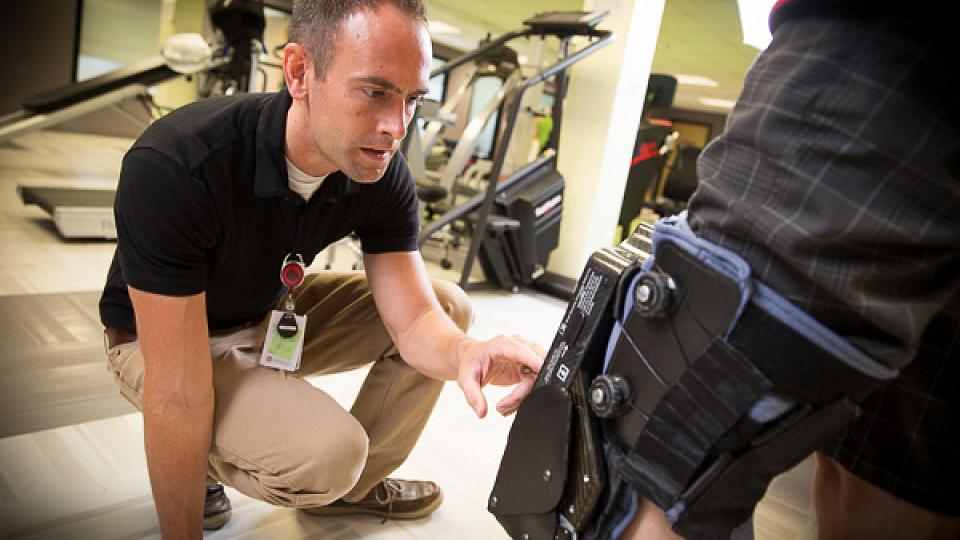
Amy: This is Amy Steinbreck talking with Dr. Steven Edgely, the director of stroke rehabilitation at the University of Utah Health. What do you think is helpful to promote a helpful recovery with a stroke victim?
Recovering from a Stroke
Dr. Edgley: A lot of recovery happens, initially, without the patient doing that much. We try to facilitate optimal recovery in the first couple of months. Those brain circuits come back to function.
Amy: So, the first couple of months are the most important, in a stroke victim's recovery, would you say Dr. Edgely?
Dr. Edgley: I would not say that.
Amy: Okay.
Dr. Edgley: Because stroke recovery can happen even years down the road. But the rate of improvement typically is fastest at the early months.
Amy: Okay.
Stroke Recovery Process
Dr. Edgley: That's due to a number of factors, specific to what's going on in the brain and [retraining] the brain cells to function. After about three to six months, it becomes somewhat more difficult to see those marked improvements, but the potential for recovery is still present. It takes the patient to challenge him/herself to do things in a way that's comfortable for them, in a way that's still challenging to them. Simple tasks around the home, using their hands or arms for simple tasks. In time, the brain will change slowly to accommodate for those new tasks and ease of movement.
Amy: It's all part of the brain, reworking those connections and reforming those connections, I assume?
Dr. Edgley: Yes, that's exactly right, and, with time, the brain will be able to lay down new connections, new circuits, and be able to find an effective work around. The main point is the patient has to keep challenging themselves, to do more and go slightly beyond their comfort zone to facilitate those changes in the brain.
Amy: Do a lot of patients find that frustrating? I know, Dr. Edgley, that I sure found that frustrating.
Dr. Edgley: It's frustrating at times, but I like to promote people training for a triathlon. Not necessarily frustrated, just challenged. Training need not be frustrating. Frustrating things are mostly a product of their own emotions. The patients are less frustrated when they see progress towards goals that are meaningful to them.
Amy: I remember in the hospital when I was just learning to walk and they had me in the wheelchair, with the railing, you know, the guided walking path.
Dr. Edgley: Yep.
Amy: I found that very frustrating. But eventually, I was able to walk with a cane, then a gait belt, and now look at me, you know?
Dr. Edgley: Yeah.
Amy: Twenty-four months later.
Dr. Edgley: Yes.
Amy: Yeah.
Dr. Edgley: Yeah so, your situation was not unique.
Stroke Rehabilitation Goals
Amy: So, Dr. Edgley, what factors do you think in the young stroke patient, are optimal influencers on promoting a strong prognosis for a recovery?
Dr. Edgley: Setting long term goals, and those goals should be something that the patient has to reach a great deal for, like 6 to 12 months, or beyond. Then teaming up with a group of people that can help you on the process.
Amy: I would say from a personal experience, a strong support network of family and friends to push you to your limit is important.
Dr. Edgley: Yes, so, pushing people to their limits is good to a point. Sometimes people, all people just need a break in knowing what your limits are, is also important. One of the unique things about changes in the brain, in improvements is, for example, if you played the piano and worked for hundreds of hours to perfect a piece, you don't sense necessarily the brain changing to make it easier to perform the task of being able to play that piece perfectly. You may perceive the completion of that perfect piece, but the brain does not have this building, built in system to signal when you're improving. So, you actually have to look at milestones, recognize the milestones, because it's not natural to do so and give yourself credit.
Amy: The self recognition, and giving yourself a pat on the back.
Dr. Edgley: Yes.
Amy: Is often important.
Dr. Edgley: Yep.
Amy: And recognizing that the milestones and the path people will take are all different. There is different milestones and different paths.
Dr. Edgley: Absolutely. Absolutely.
updated: November 3, 2021
originally published: May 6, 2015





